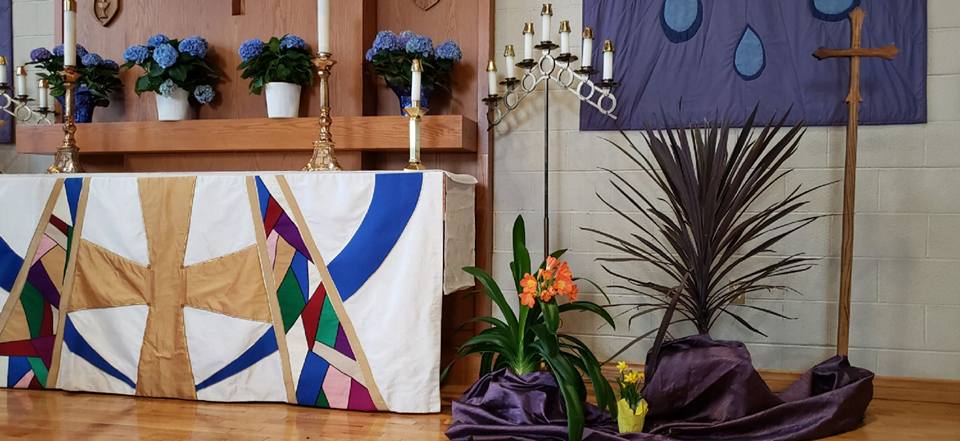Sunday, March 13, 2022:
Genesis 15:1-12, 17-18
Luke 13:31-35
You might know or recall a powerful Lenten observation by Episcopalian preacher Barbara Brown Taylor: “Whether it is a seed in the ground, a baby in the womb, or Jesus in the tomb, it starts in the dark.” How interesting it is that our religious tradition provides and encourages us to spend some time in a sort of darkness, or desert, or otherwise stark and serious internal environment. It’s counterintuitive (on a self-protective), but a sort of spiritual reckoning and accounting for the darkness of our existence, including death, is healthy. We are largely insulated from death in our western culture. We hide and professionalize it, in most cases, and make death out to be a rare and unfortunate exception. But think of the existential convulsions of our culture these past two years, and the increasing inability to reason and dialogue, in this situation in which death has been foisted right in front of us, ignorable no more. It feels to us like a radical break from the way things should be, but in reality, the fragility and uncertainty of life that we have come to know in the pandemic just brings us closer to the experience of probably the majority of human beings in the world, for whom poverty, sickness, and the environment are regularly life-and-death situations.
(I’m off to a heavy start, I realize.) But we find situations of stark sombreness in the readings today. Thousands of years ago, Abram living in a precarious situation, and without the comforts of a well-developed religious conception of an afterlife is understandably troubled that he and his wife will not live on in the lives of descendants. At best he has a sort of beneficiary in Eliezer, his slave. (These days we might cringe at his inability to embrace a scenario of a non-nuclear family.) It is a situation of threat, hopelessness, and despair, right down to the core. An existential crisis for Abram. But, the story says, God comes into this moment. “Look toward heaven and count the stars, if you are able to count them. So shall your descendants be.” And Abram believes. He chooses to live as if this will be so. And he (and God) marks this, because we are people of ritual and symbol, in this strange ceremony.
But even then, we read: “As the sun was going down, a deep sleep fell upon Abram, and a deep and terrifying darkness descended upon him.” Even with great faith… even with a sense of a one-on-one experience of, and relationship with, God, there are moments of deep darkness that will creep up, or fall upon us, or that we’ll walk into. And maybe Lent reminds us that this isn’t a failure, or a betrayal. But a part of life. A part of the journey, and an opportunity to be born again. Whether a seed in the ground, a baby in the womb, or Jesus in the tomb, life starts in the dark.’
And Jesus didn’t insulate himself from the darkness of the world. He didn’t like it, or resign himself to it. He stood up to it. “Go and tell that fox,” he says, ‘that I’m going to do what I’ve come to do.’ This Herod is the son of Herod the Great, the ruler that some of our other scripture stories say was so threatened by the birth of the King of the Jews. Jesus’s life and ministry was lived under this shadow. Jesus’s cousin was imprisoned and killed for standing on a soapbox by the river. And Jesus takes his soapbox all around the country. Every day brought new competitors, new opponents, and new threats. With the agony at Gethsemane we get a glimpse into this threat, and Jesus’s struggles. I wonder if there were other moments, not recorded in scripture, in which Jesus struggled with the weight of responsibility, the reality of the fallibility of his friends, and the spectre of death. Historians tell us that roads were often lined with crucified slaves and rebels. Death wasn’t hidden for them. But he didn’t let the Herods of the world set the terms. He would still “cast out” and “cure.”
And yet Jesus’s standing up to Herod doesn’t lead him to avoid the Cross. Because it’s not just strength or kindness that will unseat the Herods of the world, but sacrificial love and the experience of dying and rising: Jesus’s own, but also that dying and rising to our selves and our selfishness that we’re all called to. Again, Lent can us help with this. Our world is stuck in a cycle of Herods, some better than others, some worse. Think of the animals we use to symbolize those in power: lions, bears, hawks, eagles. Foxes. But this cycle lacks the creativity and Lenten selflessness to imagine something different. But Jesus does give us a different image of strength and responsibility: “How often have I desired to gather your children together as a hen gathers her brood under her wings, and you were not willing!” There’s no easy way to foist this Christian way on the world. But maybe, as bombs fall, we can lament and grieve, like Jesus did.
Some pharisees came and warned Jesus to get away from there, for Herod wanted to kill him. And Abram experienced “a deep and terrifying darkness [that] descended upon him.” But we don’t lose hope. When, in a few minutes we hear the snap of the breaking of the bread, we’re given the opportunity to remember that that hope is in a hen that stands up to the fox. It does not look like victory. But it is love.
“Whether it is a seed in the ground, a baby in the womb, or Jesus in the tomb, it starts in the dark.”
© 2022 The Rev’d Matthew Kieswetter
* From her book Learning to Walk in the Dark
